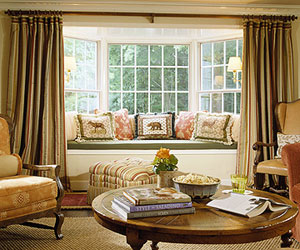In the first part of this series I talked about how to choose window coverings, based on style. Now I would like to tell you a few practical things to consider.
Analyze your windows and make a list of all the answers to the following questions.
Architecture
What shape and size are your windows? Do they look too small?
Are your windows matched in a room?
What type of molding surrounds the window? If you have beautiful trim around your windows, you may want to use a roller blind, horizontal blinds or a roman blind, so that the trim is not hidden.
Is there room for stackbacks on either side?
Do the windows open? How?
 |
| bhg.com |
Purpose
What purpose will the window coverings serve? To block light, black-out lining may be needed. To add insulation to a window, use a heavy lining.
Do you have a view? If you make your draperies the same colour, or similar to your walls, they will not detract from a focal point. Blinds, swags, or drapes that open completely will not hide a beautiful view.
Do you need privacy? Blinds, shades and sheers all filter light and unsightly views.
Will the drapes/shades by opened and closed frequently? Make sure they slide easily or are easy to reach. For high up windows, a remote control may be added.
Do you want to provide a focal point for the room? Use fabric with a beautiful print or colour, or a more elaborate style.
What type of hardware do you want to use? Is there room for it? Your hardware should match the style and colour of your room. When using wrought iron I look around the room to see if there are other metal fixtures in the room. If your decorating style is simple and relaxed, don’t use rods and finials that are modern or elaborate.
 |
| raftertales.com |
Here are some ideas for different types of windows:
Standard (small to med. sized)
Use light fabrics, both in colour and weight. Do not use a large 2” pole, it will look out of place. Simple styles, roman shades, blinds and roller blinds or shutters all work well. A single curtain caught back to one side is a good alternative to a pair of drapes. Mismatched window can be made to look the same size by hanging draperies at one height that will cover both windows. You can also make windows look larger this way, by making your draperies larger than the windows (think of hotel rooms). When doing this, make sure your draperies are not transluscent.
 |
| the30girl.com |
Tall
Styles may range from classic, formal arrangements to simpler, more contemporary styles. Don’t skimp on fabric and use tie-backs to allow plenty of light and air in. Blinds should be mounted inside the frame. If you have a low ceiling use a deep valance or tie-backs set down quite low. Use floor-length draperies for best effect.
Wide
You will usually need to provide some privacy and insulation. If you have a great view, avoid anything fussy. If you need to hide a view, try simple sheers. A single curtain hung from a pole or valance, preferably floor length, balances the proportions of the window. Plain fabrics or large designs work well.
Glass Doors
You must allow for doors or sliding windows to open and close freely. If doors open in, poles and valances must be above the top of the window frame and the curtains must pull far back enough at the sides. An alternative is to attach light-weight curtains, roll-up shades, or roman blinds to the doors themselves.
The possibilities for style are endless, you are only limited by your imagination. So start imagining!
Nikki MacCallum




Thanks – this is a good article, I wish I had read it earlier. there are some good points about things to consider. I just finished making custom lattice frames to cover up some blinds in my living room. I’m not a designed but should have looked into it more!
http://ottobelden.blogspot.com/
Thanks again!
Wow………… What a source is this! I have truly found some of most excellent and exotic features about exceptional window treatment from this post. As the magnificent criteria of this post is extremely looking just heart throbbing. Thanks for sharing.
roman shades
Thanks for the details mentioned in the blog by you.
Wall Coverings